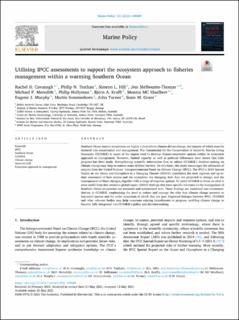| dc.description.abstract | Southern Ocean marine ecosystems are highly vulnerable to climate-driven change, the impacts of which must be factored into conservation and management. The Commission for the Conservation of Antarctic Marine Living Resources (CCAMLR) is aware of the urgent need to develop climate-responsive options within its ecosystem approach to management. However, limited capacity as well as political differences have meant that little progress has been made. Strengthening scientific information flow to inform CCAMLR’s decision-making on climate change may help to remove some of these barriers. On this basis, this study encourages the utilisation of outputs from the United Nations’ Intergovernmental Panel on Climate Change (IPCC). The IPCC’s 2019 Special Report on the Ocean and Cryosphere in a Changing Climate (SROCC) constitutes the most rigorous and up-to-date assessment of how oceans and the cryosphere are changing, how they are projected to change, and the consequences of those changes, together with a range of response options. To assist CCAMLR to focus on what is most useful from this extensive global report, SROCC findings that have specific relevance to the management of Southern Ocean ecosystems are extracted and summarised here. These findings are translated into recommendations to CCAMLR, emphasising the need to reduce and manage the risks that climate change presents to harvested species and the wider ecosystem of which they are part. Improved linkages between IPCC, CCAMLR and other relevant bodies may help overcome existing impediments to progress, enabling climate change to become fully integrated into CCAMLR’s policy and decision-making. | en_US |
